Discover: Lands Unknown
Publisher: Fantasy Flight Games
Format: Board Game
Number of Players: 1-4 Players
Price: $60
Copy Purchased By Reviewer
October 25, 2018
I can’t call this article a review for a few reasons. The first reason is that Discover: Lands Unknown itself is literally impossible to review when you only have one box. I can’t see all the content, all of the potential that this game has to offer. The second reason is that after multiple playthroughs, the amount of mixed feelings I have about Discover actually overwhelms me.
On one hand, this game is a decadent adventure, filled with surprises and happy moments of discovery. The twists and turns that you experience playing through a scenario will make players shout loudly from where they sit. The thrill of finding out what is in your particular box is better than any shrink-wrapped booster pack of Magic: The Gathering.
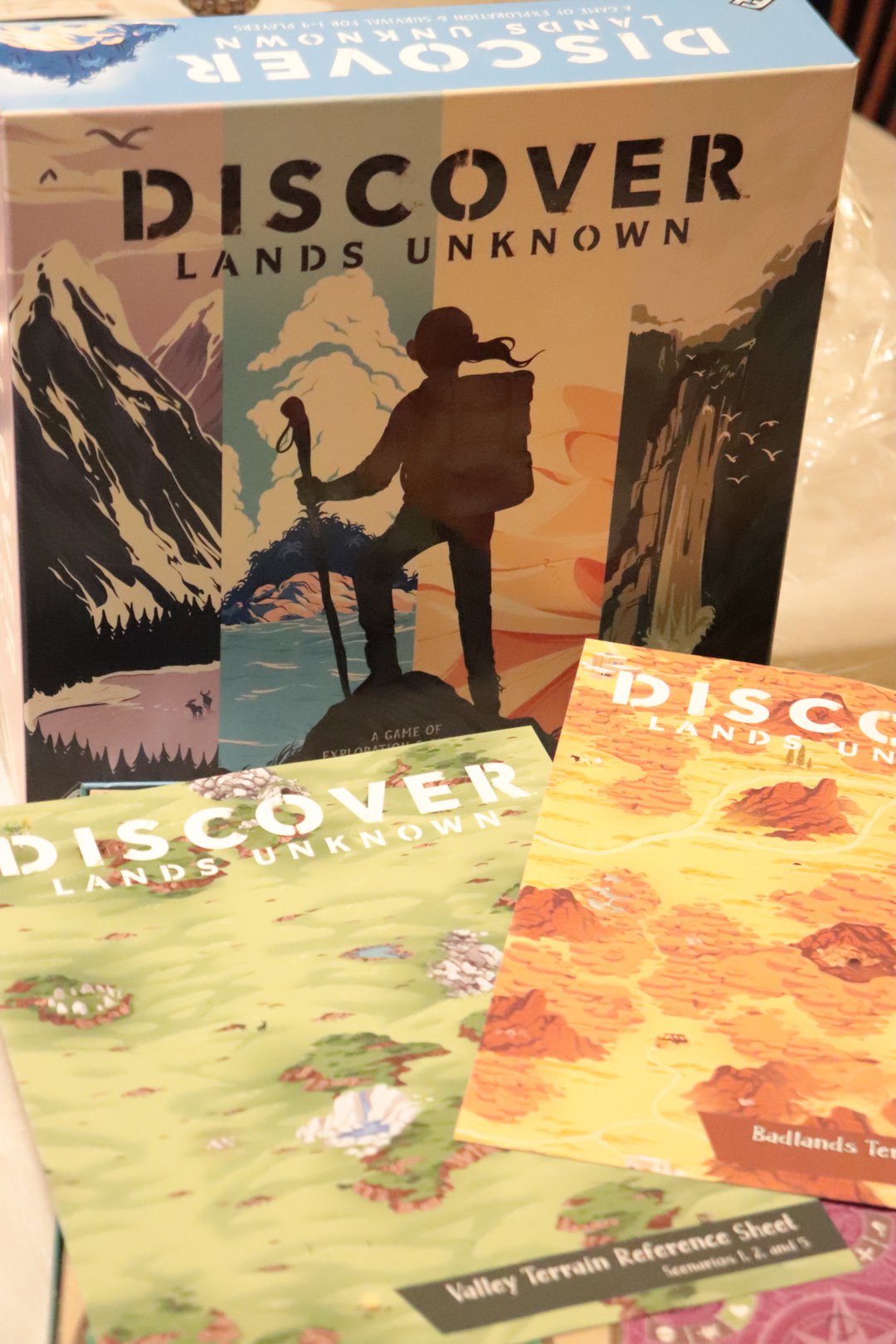
When you open a copy of Discover, it might just be the most exciting unboxing you'll ever have.
On the other hand, this is a game that might be less replayable than many of the games on your shelf. It might be a mess of ideas that is so much fun when you first play, but leaves you staring at the table, wondering whether or not it was worth your money.
Give me a chance to explain.
So What Exactly Is Discover: Lands Unknown?
Discover: Lands Unknown is a Unique Game. It’s a new classification of board game that in many ways, Discover will set the bar for. The big takeaways are right there on the game box; there are six different terrains in the game, but your game will only come with two. There are 36 characters in the game, but you get just twelve. It sounds suspiciously like you didn’t get a complete game. At first look, this just makes you feel like this is a random ‘lootbox’ purchase. Hold on though, because the differences between boxes goes a lot deeper.
Each Discover game comes with a set of scenarios split up over the two types of terrain in your box. There are 4 scenarios in total, with a 5th scenario that’s less story, more last-man-standing, playable on either map. What isn’t as apparent at first is that the scenarios you get can be wildly different, and are loosely connected. Without giving away too many spoilers, the story in my box revolved around trying to find stone archways to escape the valley I had begun in. When I looked up a few youtube videos of initial unboxings, this one clearly referenced a scenario which sounded a lot more like The Hunger Games, even though they were also playing in the valley.
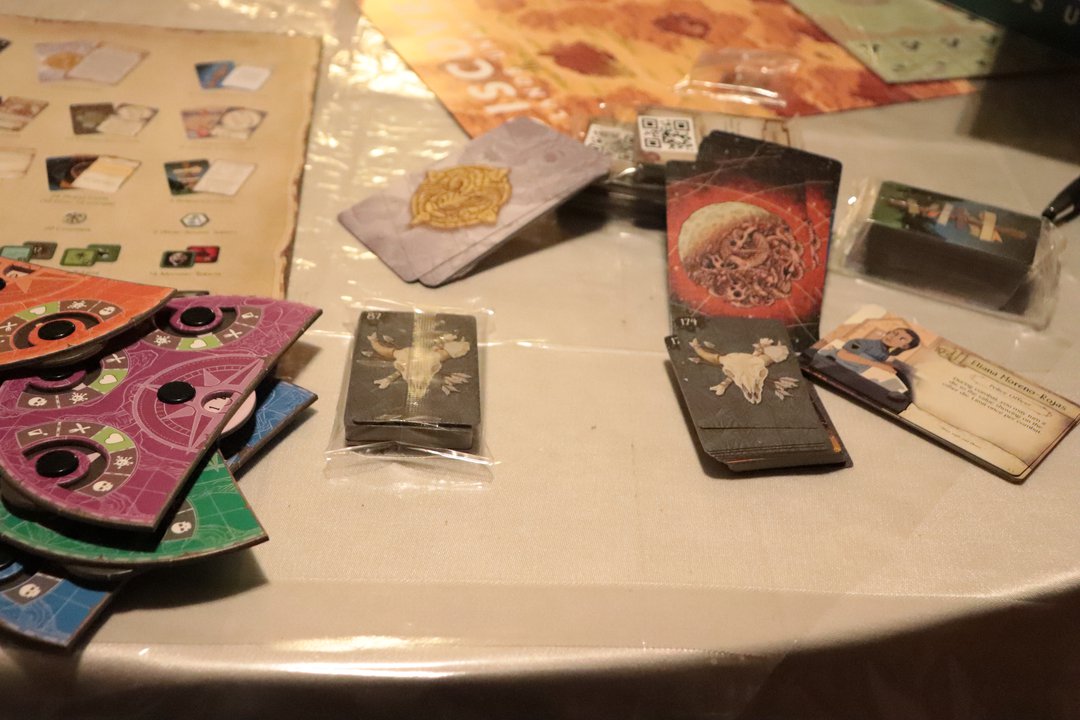
Everything inside your game has QR codes on the shrinkwrap. I can't imagine how intense figuring out how to sort all the components for shipping was.
The differences between boxes end up going even deeper: the terrain you might have on your tiles could be wildly different than what I have in my box, with a different set of landmarks. The exploration deck that you receive might have differing cards, yeilding differing results when searching for resources on the same map. Each terrain also comes with a set of ‘unique monster tokens’, which are typically tied to particular scenarios or events. The list of possible differences goes on and on.
What this means is that Discover: Lands Unknown doesn’t just feel like a randomized box but a personalized one. The box you receive will be different from your friends, even if you both receive the exact same terrain types. Sure, you have multiple options for heroes in your game, but the ones that someone else gets will give their scenarios a different feeling.
How much do these differences matter? That’s the real question that I’m still pondering. Strap in: there is a lot to cover.
The Basic Tenets of Survival
I had to talk about the randomization first before the gameplay of Discover because it’s such an integral part to the mystery and wonder that comes alongside playing. Truly, where Discover: Lands Unknown shines is in that first game when you and your friends set up at the campfire, first look out at the map, and realize just how clueless you are about what’s going to happen next.
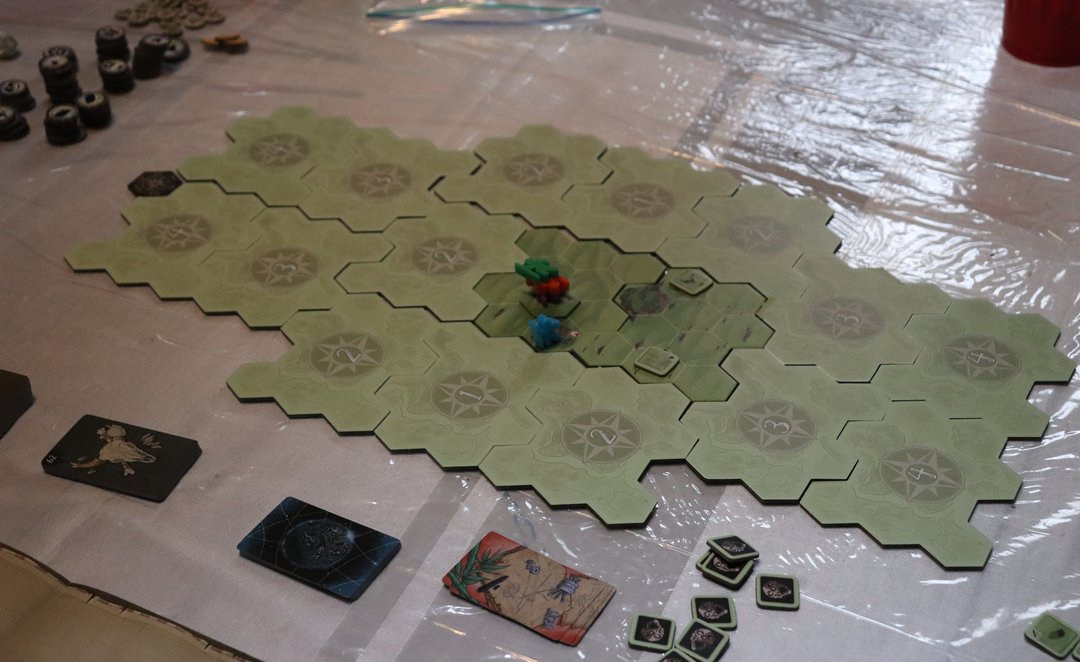
An unrevealed board is tantalizing, especially when you have no idea what each tile might have on it!
The most important part of the game comes from that need to explore you immediately feel when you take your first turn. One of the (ten!) different actions you can take on your turn is to scout: if you end your character next to an undiscovered zone, you can flip the tile as you scout it out. Landmarks appear, and you might find yourself leaning forward in glee as you discover an abandoned hunter’s blind or the wreckage of a plane. A bunch of tiles end up on the board, signaling possible resources – wood, rocks, food, water.
You can investigate landmarks like the hunter’s blind. When you flip over the corresponding exploration card, it feels like you are opening pandora’s box. Maybe you find nothing, or maybe you find valuable pre-cooked food. Maybe this landmark gives you a needed clue on how to beat this specific scenario, but you won’t know until someone tries.
Don’t count out the normal tiles though, because in some way, they are more exciting. Collecting wood, stone, meat…resources are important, because they allow you access to new options. Every character has two projects dealt out to them at the start of the game, and they can use resources to craft new items: torches to light new fires or stone knives for desperate attempts to keep yourself alive.
Alive, you might ask? Why, yes! Yes, for you are not alone in the wilderness. Oftentimes, while foraging for food, you might run into a rabbit or a deer; simple enough to roll some dice and try to catch it for food. Or you might run into a wolf, and things get a little more dangerous. The dice begin to feel more dangerous now: while the grey die is your roll to hit, the red die is their roll to damage you. While you can fudge the die rolls with items, burning resources, or friendly assistance, damage always threatens you.
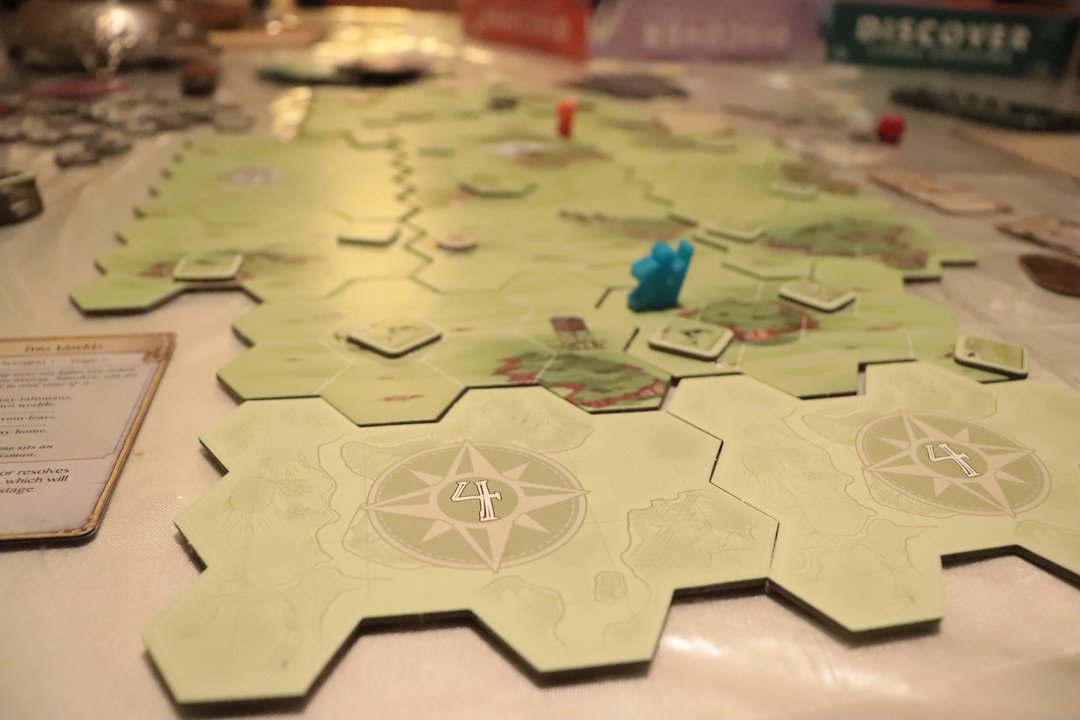
I'd worry about revealing the map, but every game can have different tiles, with completely different landmarks!
Unfriendly woodland creatures are only the beginning, by the way. Certain events that trigger from scenario events, landmarks, or even simple gathering tiles will cause creatures to infest the terrain you’ve uncovered. Oftentimes it is just a (still dangerous!) bear. Other times, it’s something different and possibly more sinister. Do you want a hint about what kind of monsters are possible? Well, as you read the scenario cards in your particular game, they’ll give hints as to what exactly you are up against out there. I’d be worried about spoiling, but your monsters might be very different than mine.
Of course, I’ve led you all astray talking about monsters, because you can absolutely die without being in a single fight. When you look at the (gorgeous) player trackers, you’ll notice that there are four dials. The bottom one is for stamina, which replenishes during the night every turn, limiting how much you can do in a single day. The other three are health monitors: every dial you turn to something besides the green heart lets you know that you are either starving, dehydrating, poisoned, or bleeding out. Once all three dials are like that, one more point of damage from any source will send you to the great beyond. Don't worry though: the other survivors can loot your still-warm body for supplies and still win the scenario.
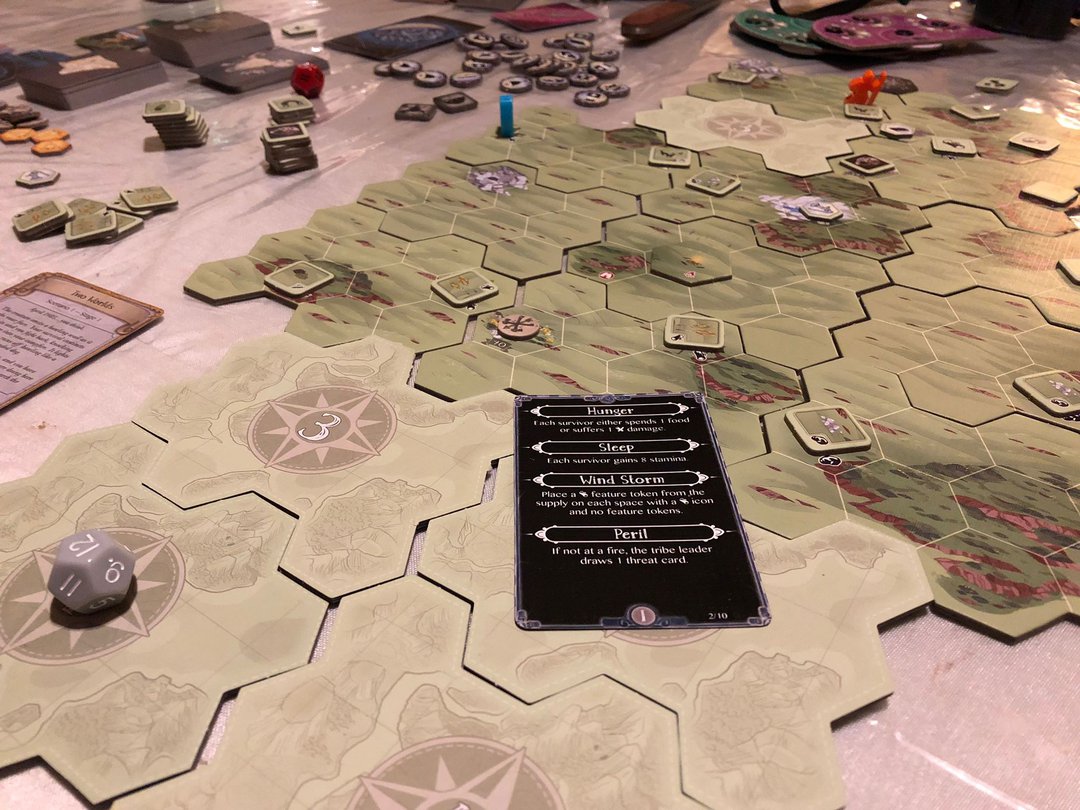
You can spend stamina and some resources to recover health, but you’ll also need a supply every time night arrives. Drawing from a deck, every night brings new danger, and a new cost to your supplies. You might end up needing to eat; don’t have food and you start to starve. Finally, of course, you might find yourself threatened just because you dared to spend the night away from the safety of a fire. New threats arrive, leaving you vulnerable. Like wandering through Breath Of The Wild in the dark, you are gambling with what you might find waiting for you.
If it isn’t already obvious, the first exploration of your terrain is exciting, intense, and filled with moments that will leave you nervous as you turn over the next card.
Alright, But Where’s The Story?
This section contains some minor spoilers: while each game box is different, this portion reveals some of the possibilities of how a scenario might go.
What I’ve covered so far is the core gameplay loop: use stamina during the day, try to find supplies to survive through the night, deal with an increasing sense of scarcity. It’s a fun cycle, but survival and exploration alone isn’t enough. You need a reason to be out there, and that’s where part of Discover’s core gimmick kicks in. What will the scenarios throw at you?
From what I can tell, most games start off with the same general theme: you and your compatriots wake up at a campfire in the middle of an area you are not familiar with. Oftentimes, amnesia comes with your situation, as you attempt to piece together what you are supposed to do to survive, escape, or whatever your scenario tells you. Your character – which can be anything from an assassin to a pharmacist – is just trying to make it out alive.
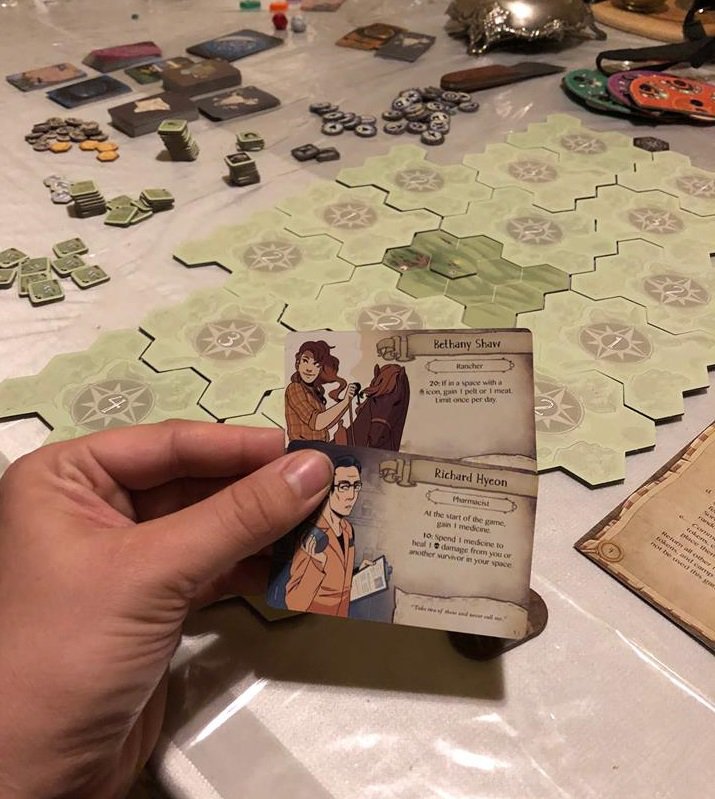
Remember, your box comes with 12 options, but there are 36 characters total in the game! Maybe some are terrain specific? I don't know!
In our story, each scenario has multiple parts: the first part always revolves around exploring the map, forcing players to desperately scramble over terrain and uncharted land to find answers. Finding landmarks or a particular item, this is the portion of the game that is obviously intent on making you reveal lots of exciting options, treats and threats. Exploration in this game is very fun, but it’s the scenario that gives the action that extra little urgency as to why you are doing it.
The second (or third!) part of the scenario is usually where things take a hard turn, focusing in on what the real objective actually is. It could be fighting a monster, or trying to find an abandoned mineshaft. It might be revealing that you need to find a special item first in order to open your path to victory. Suddenly, the players will be scrambling to look at the scenario card, looking at the map with new eyes to try and figure out what the win condition really is.
Something I haven’t mentioned yet: this is a co-operative game, but only those that make it out alive actually are considered to win. My first game was with two players, and the final round was my dear friend dying of thirst in front of me. I ransacked their body for a knife and quest item, before throwing myself at the monster blocking my way to glory. In my three player game, a threat card had me stumble out into the wilderness, where something that was absolutely not a wolf was waiting to break my body. The other two shed no tears as they made their way to the exit.
The four player scenario we played had everyone working in complete harmony: one person charging creatures while the others all used support cards. If they succeeded, they’d all succeed. Every character traded food and medicine to make it feel like a young adult hero’s novel that was all about friendship getting you through. In one of my other games, we realized in absolute horror that only one person could win at a time.
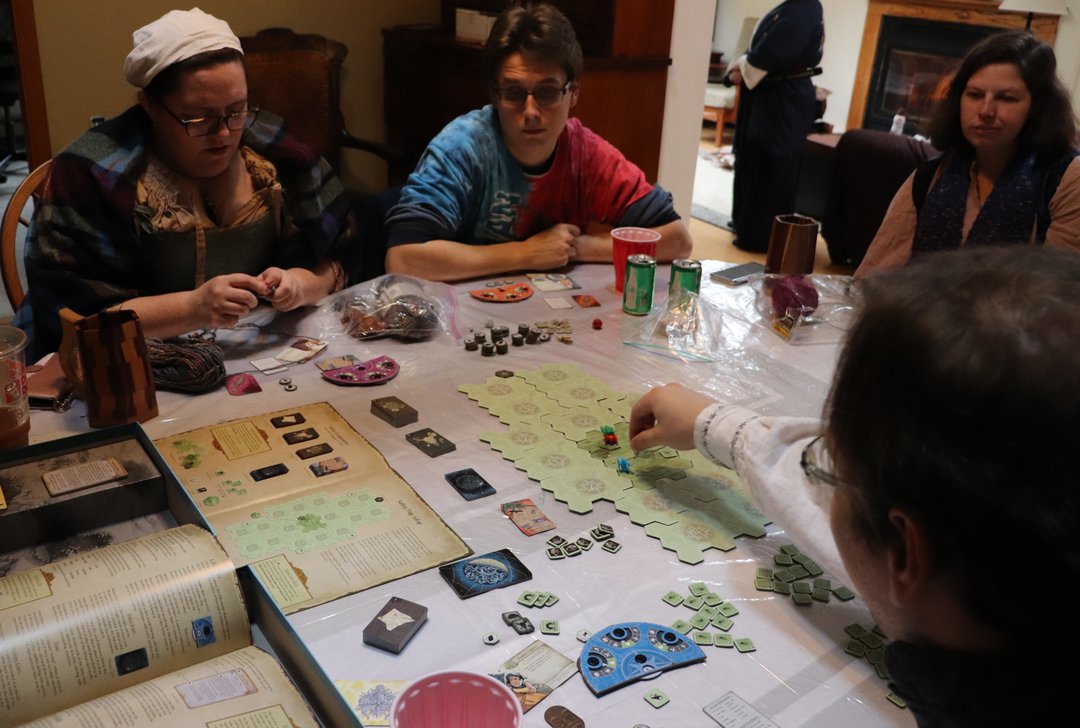
In our experience, Discover is best played with very talkative friends. Also, before anyone asks: we're playing at a Halloween party.
Finally – and this was a surprise to me – all of the scenarios we had were woven together. They all appeared to take place in 1985. They all referenced the same special objects, or revolved around the same core concept. In a lot of ways, Discover: Lands Unknown is an interactive story that you unlock. You can think of it like a very pretty Choose Your Own Adventure book or a more streamlined Dungeons And Dragons-esque adventure.
What Works Well
You might have noticed my slightly gushing tone over the last few sections. It’s there for a reason; this game does many things right, and tries to do new things bravely. When Discover checks all the boxes, it’s an experience that transcends most board games. It becomes a shared story that feels alive, one that feels unique to whoever gets a chance to play alongside you.
The feeling of exploration is tangible here. Every time you have someone reveal part of the map, the whole table ends up holding its breath. Scenarios often start with “once you investigate landmark #xxx, you can move onto stage two”, and so you desperately clamor over mountain peaks to try and find salvation. A cry of victory goes up from the table as someone finds what you are looking for.
The outbursts of relief or excitement aren’t always story based either. Sometimes, it’s just about survival. The fear of being left alone in the wilderness creates constant tension; finding ways to make new campfires to create Dark Souls-like safe areas will be a constant discussion. Realizing that one of your friends is about to die without water, and trying to figure out a way to hydrate them without wasting resources is a huge part of the fun.
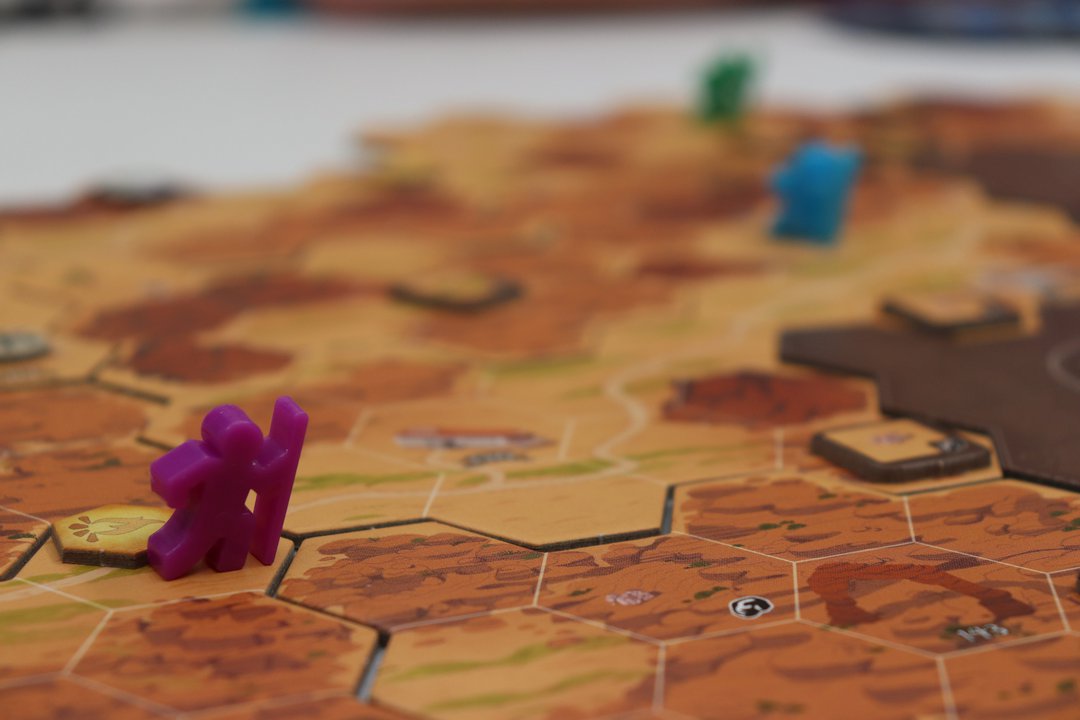
It might look like a small board, but right now I feel so very alone out in the wildnerness.
Speaking of characters, your scenarios will feel different based on which characters end up in your box. We had the mountain climber, who could scramble over rocks to gather materials in hard to find areas. We’ve had a rancher who could find food easier, or a construction worker who became a factory of weapons and tools. It adds another layer of texture to the game; I’ve watched a muscle-bound lumberjack keel over from lack of water, while a timid, seemingly useless heiress desperately throw herself at a monster without anyone left to hide behind.
Each of these elements weave back together to the exact same highpoint: that initial rush you feel playing this game. The first time you run into a landmark and discover what it might be, or the first time you use a character’s power to save the day, it’s hard to beat that rush of excitement. Discover is very well named, because so much of the fun comes from that first jolt when you wake up at the camp fire, still trying to decide how to even begin.
When you look at this game as if it were an interactive story, then Discover: Lands Unknown can be worth its weight in gold.
…And What Falls Flat
This brings me to the downsides. I'll be blunt: these can be severe enough that many people might not look past them. So much of Discover relies on two things: the feeling of story, and the feeling of novelty. Once either of those bubbles are burst, the magic leaks out of the game, making it feel lifeless.
The first downside I want to cover is more of a warning than an outright critique of the game: this is not a game that will please everyone. When you come to the table to play Discover, you have to understand that you aren’t there to run calculus, to make a perfect tableau, or to break the code to optimize victory point acquisition. This is a game meant to elicit feelings, with highs and lows aplenty; when players start to play it as a numbers game, the oxygen gets sucked out of the room.
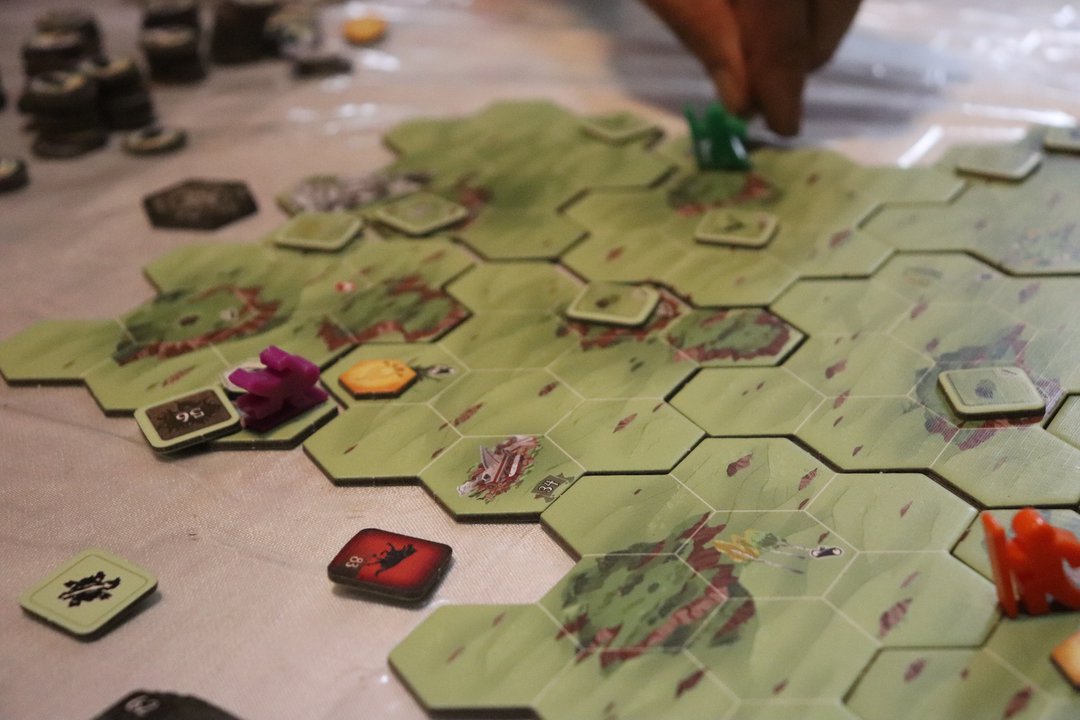
This typically happens near the end of a scenario, as people realize that their supplies are almost out, or they just need one more item before finding victory. The thrill of turning over new tiles has passed, and as the wonder of exploration fades, people become more inclined to play mechanically, rather than as if you were in an RPG. It gets easier to retract into running internal calculus to ‘win’ rather than just ‘play’, and with so many of the mechanics of Discover being based around finding new things, the game can feel like it runs out of steam.
This leads me into the second major detraction: replayability. This is, again, a very story based game. Much of the fun comes when the first time plot twists (yes, there can be plot twists!) are revealed in your exploration deck. The first time you beat a scenario, the sense of triumph around the table is amazing. But do you want to play that scenario a second time? Part of the fun was trying to figure out where exactly to find the (insert item here) to escape, or trying to figure out how landmark XXX was in any way going to help you solve your (insert very bad thing here) problem.
Once you’ve beaten the scenario, will the game be fun to return back to? Will the magic be gone?
A Standard-Shattering Concept, But Can It Last?
Before writing this, I made sure to play through the box, and played alongside twelve different people total to get a varied set of opinions. Two reactions were shared by practically everyone who played the game, or even just watched a round.
The first reaction was an almost giddy thrill of excitement as the first landmark was discovered, and its card was read aloud when investigated. You could see players lean in more, trying to find the next unexplored object to reveal.
The second reaction was a silent pause, as the game finished, and people stopped cheering about surviving. A head tilt, as players stared at the game, trying to answer a self-imposed question: they liked the game, but could they imagine buying a copy themselves? Was it really worth the cost?
One of my friends, Parker, played several games and watched others. He loved running around and exploring, abandoning campfires just to see what happened next. When he watched another team play the same scenario he had done however, he confirmed one of my fears: the unbridled joy of the game was absent since he knew where to find the right item to win.
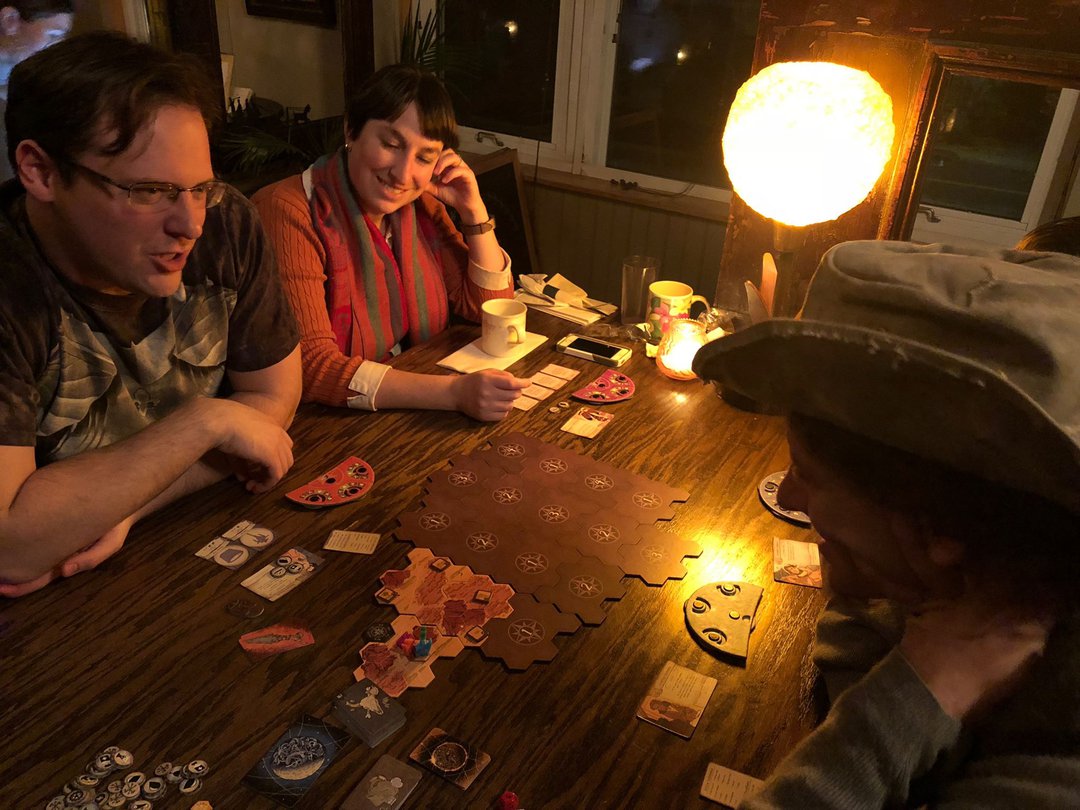
Deciding the best way to survive can create some heated moments...and that's not always a bad thing.
Several of my other friends really enjoyed their time playing the game but didn’t feel as though they needed to buy a copy for themselves. They got what they had wanted out of this particular experience – the novelty had been sampled, and $60 dollars was just a little too much for them.
Our writer Eric summed up his criticism very well: the first few rounds are fantastic, but it begins to drop off very quickly. Once the exploration is complete, some of the game mechanics like combat start to drag if a play session carries on too long. It gets easier to look past the story and just try to win.
On the other side however, I had Sam leave the table laughing until she couldn’t breathe…thanks to my horrible death in the badlands. The story possibilities were so exciting for her, she couldn’t wait for the local gaming store to get copies in. Tony, who manages a local gaming store, ordered copies to make sure he had one for himself. The idea that he could have this much fun playing my copy, and then end up with a wildly different experience on his own shelf, intrigued him.
This is a game for your friends that enjoy tabletop RPGs, not the ones who want to optimize every move made in Pandemic. This is a game for those who love the idea of escape rooms and new experiences. If you like the idea of Legacy Games, you’ll probably enjoy Discover. If you find the idea of a Legacy Game abhorrent, then Discover is probably not for you. This is a game that is supposed to be enjoyable in the moment, not if you are worried about getting a particular value-per-game-played out of it.
So After All Of That… Should You Buy A Copy?
Discover: Lands Unknown manages to amaze in many ways and can create passionate high points that excel past what you might consider a ‘solid’ game that takes no risks. For that, I will always be thankful that this game simply exists. I am delighted and happy to have bought a copy for myself, and to share it with so many people. When games take risks and push the envelope, I think the community wins as a whole, because it opens up new possibilities.
Discover: Lands Unknown is almost guaranteed to be divisive in how people react to it, partially because of it being the first board game that’s been released with the “Unique Game” title. Much like the Legacy Games concept which has come before, there will be many that flock to the idea as innovative and groundbreaking, while others will write it off as a gimmick and a waste of time. I can’t tell you how you will react to everything that comes along with one of these boxes; some of the ideas might make you fall in love with the idea of Unique Games. Other parts might put you off the concept entirely.
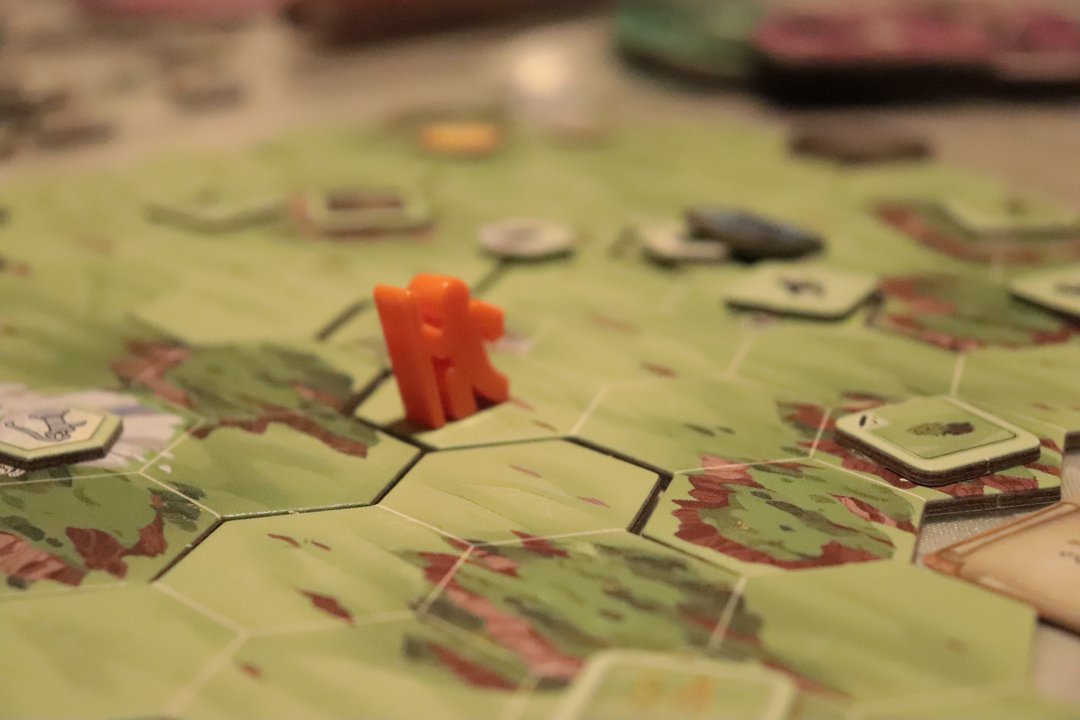
At the end of the day, I wished for two things: that the game could come with maybe one more scenario or just be $10 cheaper. If it did that, I would recommend this game whole-heartedly. I’d even recommend that the game was worth picking up twice if you liked it. But I can’t. For many board gamers, this game might be just a little too expensive for what they get out of it.
I still think you should end up playing this game. If you have a weekly board game group, splitting the cost to get a copy might be the way to go. If you have a regular RPG group, Discover would be a phenomenal experience to try something new as a break between campaigns. Find a way to try this game, because I think it’s absolutely worth playing at least once.
For myself? I’m eagerly awaiting this weekend: a friend upstate picked up a copy after playing with me last week. They got the arctic and desert terrains, and I can’t wait to see just how different their copy of Discover is.